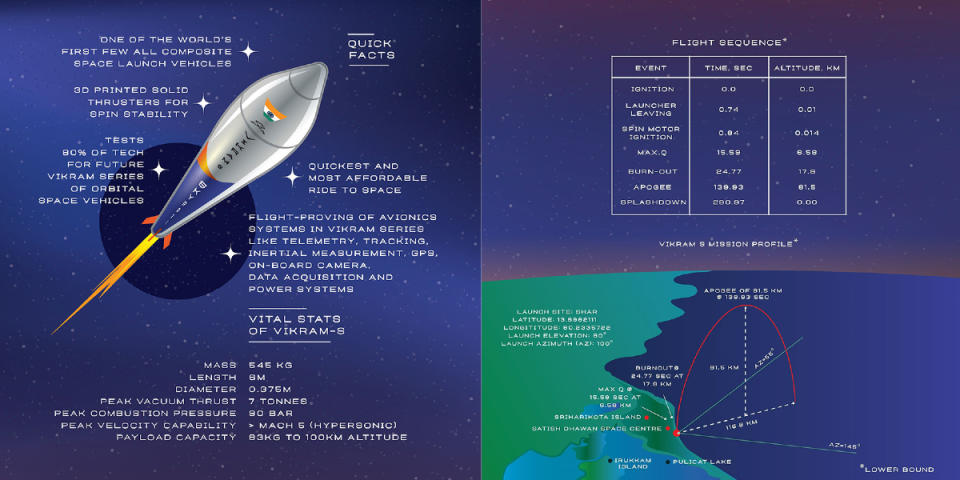India's first private rocket, built by startup Skyroot, makes successful launch
India's space agency has successfully launched the Vikram-S after much anticipation and years-long work in a boost to the private sector of the nation's space industry.
The Indian Space Research Organization (ISRO) kicked off the suborbital rocket at 11:30 a.m. local time Friday from the Satish Dhawan Space Centre in Sriharikota, India.
The Vikram-S, developed by four-year-old startup Skyroot Aerospace, is a single-stage, spin-stabilized solid-propellant rocket with a mass of around 550 kilograms. It carries three customer payloads, including one from a customer outside India. Made of all-carbon fibre core structure, the six-meter-long rocket was developed in two years.

Image Credits: Skyroot
The demonstration mission, named Prarambh ("the beginning" in Sanskrit), is the first by Hyderabad-based Skyroot. The startup is building a series of launch vehicles named after Vikram Sarabhai, the founder of India's space program.
In June 2020, the Indian government passed the space sector reforms and established the Indian National Space Promotion and Authorization Center (IN-SPACe) to allow private companies to use ISRO's infrastructure. New Delhi also set up NewSpace India Limited (NSIL) as the space agency's commercial arm to work closely with private companies and startups to bolster space developments in the South Asian country.
"I am happy to announce the successful completion of mission Prarambh, 'the beginning' of Skyroot Aerospace. The rocket VKS [Vikram-S] took off at an LEA (launch elevation) of 80 degrees and azimuth of 100 degrees, achieved an altitude of 89.5 kilometers and a range of 121.2 kilometers — exactly what was planned by Skyroot Aerospace. All systems, as I can make out, worked as planned and Skyroot Aerospace has demonstrated capability of various subsystems that will go into the orbital launch vehicle," said Pawan Goenka, chairperson of IN-SPACe, Department of Space, after the successful launch.
Founded in 2018 by former ISRO scientists Pawan Kumar Chandana and Naga Bharath Daka, Skyroot successfully test-fired India's privately made solid-rocket stage in December 2020. It was also the country's first startup in 2021 to sign a memorandum of understanding with the ISRO to launch its rockets.
The startup has raised $68 million in total, including $51 million in a Series B round led by Singapore-based GIC in September, and has a valuation of $165 million.
According to the data shared by Indian Space Association (ISpA) with TechCrunch, Indian space startups have raised more than $245.35 million, with $108.52 million infused in 2022 alone. The association counts Skyroot as one of its members, alongside private companies including Bharti Airtel and OneWeb as founding members.
The government is currently working on a new space policy to increase private participation and encourage investment in the country's space sector.
In a recent interview with TechCrunch, ISpA Director General Lt. Gen. AK Bhatt said the space policy would address some issues raised by the industry players, including a single sanction window and spectrum allocation for satellite-based communication services through the Department of Telecommunications.
The industry players have also requested the government to open foreign direct investment policy and incentives on taxes, import duties and domestic manufacturing of space equipment that are yet to be addressed.
"We're very excited to announce that we scripted history today by successfully launching India's first privately developed rocket Vikram-S," said Chandana of Skyroot. "This Prarambh mission, as the name signifies, is the beginning of a new era in the Indian Space ecosystem. Team Skyroot dedicates this successful mission to Dr. Vikram Sarabhai, who boldly started the Indian space program in the 1960s and honorable Prime Minister Shri Narendra Modi ji, who unlocked the space sector to the private players. And most importantly, we thank InSPACe and ISRO, all their teams and the dynamic leadership who enabled this mission in this most efficient way."

 Yahoo Finance
Yahoo Finance 